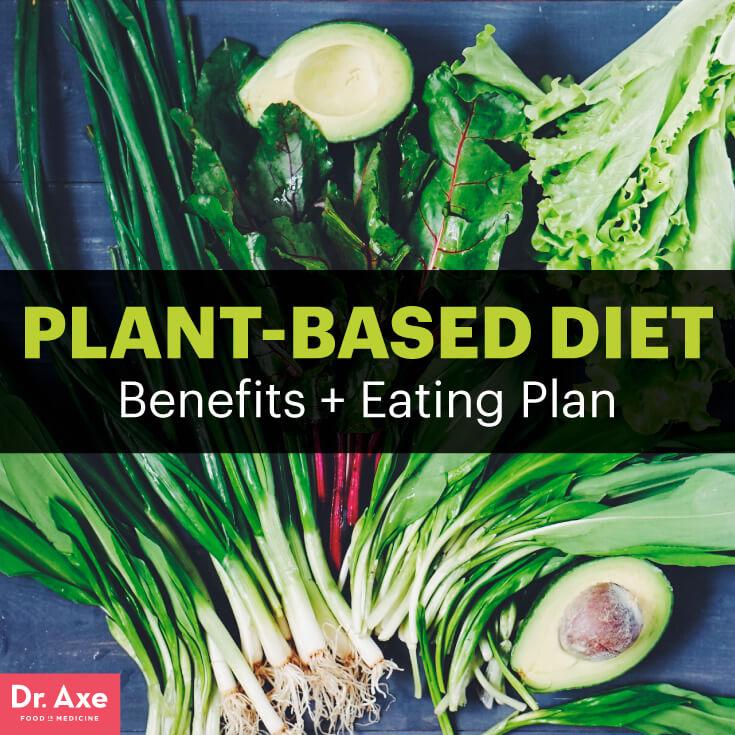Plant-Based Diet: Disease-Protective + Promotes Major Weight Loss
December 18, 2018
Dr. Axe on Facebook Dr. Axe on Twitter Dr. Axe on Pintrest Share on Email Print Article
Plant-based diet - Dr. Axe ==>> https://draxe.com/nutrition/plant-based-diet/
Harvard Medical School — which considers their own Harvard Healthy Eating Plan to be one example of a balanced, plant-based diet — reports that “The latest and best scientific evidence shows that a plant- based diet rich in vegetables, whole grains, healthy fats, and healthy proteins lowers the risk of weight gain and chronic disease.” (1)
Many other health authorities also now promote different variations of mostly plant-based diets, including the American Cancer Society and American Heart Association. Experts believe these diets can beneficial for helping both children and adults to increase their nutrient intake, while lowering excess or “empty calorie” intake. It’s been shown that plant-based diets (similar to vegetarian diets in many ways) offer protection against coronary heart diseases, metabolic syndrome risk factors, some cancers, obesity, hypertension, type-2 diabetes and cardiovascular mortality. (2)
Eating more plants, especially veggies and fresh fruit, in place of things like processed meats and packaged products is said to be one of the most valuable things we can do to treat obesity and help reverse the growing obesity epidemic.
While this is a good reason to go plant-based — considering two out of every three American adults, and one out every three children is now overweight or obese — there are many other reasons to eat more plants, too. These include lowering your carbon footprint, spending less on groceries overall, supporting organic agriculture, reducing your risk for most chronic diseases, and much more.
What Is a Plant-Based Diet?
Plant-based diets are modern takes on many types of healthy traditional diets that relied on widely- available plant foods — including vegetables, fruits, starches like potatoes or corn, beans/legumes, nuts, seeds and healthy fats like whole coconuts or olives.
There isn ’ t necessarily one “ plant-based diet ” in existence today, but rather dozens of different variations that stem from cultures found all around the world. Examples of popular plant-based diets include: The Mediterranean Diet, Macrobiotic Diet, Vegan Diet, Raw Diet and various types of vegetarian diets.
Research done at the University of Oxford Cancer Research Center showed that in general, plant- based/vegetarian diets provide relatively high amounts of complex carbohydrates, omega-6 fatty acids, dietary fiber, vitamin C, vitamin E, magnesium and antioxidants such as carotenoids or folic acid. While a plant-based diet can be very healthy, it sometime takes some planning to make sure you’re getting enough long-chain omega-3 fatty acids, retinol, vitamin B12 and minerals like zinc. (3)
Not ready to give up animal foods? That’s actually not a problem. Not every plant-based diet is vegan or even vegetarian. Many include quality animal foods, but aim to do so “in moderation” — it’s something taken in consideration when comparing Paleo vs. vegan diets. In other words, foods like meat, fish, eggs or dairy aren’t necessarily off-limits when you’re eating plant-based, they just usually take a back seat to eating lots of unprocessed plant foods. Aim to limit to less than 10 percent of your plate if selected.
How many plants can you expect to eat as part of a plant-based
diet?
It all depends, since every plan and person is different. Some plant-based diets such as the Ornish Diet , The “ 80-10-10 Diet ” and vegan diet are very high in carbohydrates (like veggies, fruit, beans and grains) but very low in fat and protein. Following these diets might mean you ’ re getting up to 60 – 80 percent of your daily calories from the carbohydrate macronutrient and as little as 10 percent from fats or proteins.
“When analyzed, some of the longest lived civilizations in the world like Okinawa, Japan eat a diet comprised of foods that are over 80 percent carbohydrate macronutrients,” says Joel Kahn, MD, a clinical professor of medicine at Wayne State University School of Medicine and author of The Whole Heart Solution. “As long as calories from carbohydrates are whole and unprocessed, such as oats, whole wheat, spelt, quinoa and rye, high amounts are favorable and associated with health.”
Other varieties, such as the DASH Diet or Mediterranean Diet, might be around 40–60 percent carbohydrates, but include more healthy fats and proteins.
Plant-based diet guide - Dr. Axe 5 Plant-Based Diet Benefits
1. High In Anti-Inflammatory Food
Inflammation is now being tied to nearly every chronic disease there is, from leaky gut syndrome and arthritis, to cancer and heart disease. Anti-inflammatory foods help stop the progression of disease by supplying nutrients that fight oxidative stress (also called free radical damage) including:
Antioxidants and phytonutrients (such as flavanoids, resveratrol, quercetin, beta carotene, and more) Essential vitamins such as vitamin C, E and A Trace minerals Electrolytes Essential fatty acids Studies show that diets high in anti-inflammatory foods promote longevity, regulate the immune system, and impact the way inflammation affects our bodies and our lives. Plant foods can help foster better gut health, boost immune functioning and reduce autoimmune reactions that can cause a cascade of age-related diseases. (4)
2. High in Fiber
Plants such as vegetables, seeds, ancient grains and legumes are high-fiber foods that are capable of lowering your risk for constipation, digestive problems, high cholesterol, heart disease and diabetes.
A high fiber diet helps to prevent cravings and overeating, keeps your arteries clear from plaque, and allows healthy probiotic bacteria to thrive in your GI tract. Soluble fiber slows down digestion and makes you full by attracting water and forming a gel-like substance, while insoluble fiber tends to speed up digestion by adding bulk to stool.
Some of the top high fiber plant foods to include in your diet? These include avocado, flax or chia seeds, berries, gluten-free oats, coconut, apples, cabbage, artichokes, figs or dates.
3. Can Help You Reach or Maintain a Healthy Weight
Research shows that plant-based diets are cost-effective, low-risk interventions that can help reverse adult and childhood obesity. Plant-based (or “ mostly plant-based ” ) diets are tied to a lowered risk for obesity, lower BMI status and reduced complications related to obesity including heart problems or metabolic syndrome.
A 2013 study published in the European Journal of Clinical Nutrition found that an 18-week dietary intervention using a low-fat plant-based diet helped improve body weight, plasma lipids and glycemic control. (5)
4. Lowers Your Risk for Chronic Diseases
Many populations living around the world that still eat “ traditional diets ” high in plant foods tend to suffer from far less chronic diseases overall than those eating modern Western diets do. In the world ’ s “ Blue Zones ” — where the highest percentage of people living over the age of 100 can be found — plant-based diets help to reduce the rates of heart disease, cancer, dementia, diabetes, osteoporosis and more.
The famous Lyon Diet Heart Study found that a Mediterranean-style, mostly plant-based diet could cut heart attacks and death rates due to heart disease by 70 percent compared with a traditional American Heart Association diet. (6) Other research has shown that plant-based diets can significantly help lower body mass index and high obesity rates, high blood pressure, high triglyceride and cholesterol levels, diabetes risk and more. (7, 8)
Plant foods that are commonly eaten in the healthiest parts of the world? These include: leafy green veggies, fresh herbs and spices, tropical fruits like mangoes and pineapple, nuts and seeds (almonds, walnuts and cashews, for example), corn and ancient grains, olive oil, beans and sweet potatoes.
5. Good for the Environment
Not only does a plant-based diet have benefits for your waistline and health, it ’ s also good for the planet. Eating foods that are “ lower on the food chain ” takes less natural resources to produce, has a lower carbon footprint, spares the lives of livestock, and reduces food scarcity globally.
According to a report in the American Journal of Clinical Nutrition, manufacturing animal foods requires a higher proportion of water, land, fossil fuels and energy than most plant foods do. (9) So if everyone were to even cut back their intake of animal foods in favor of eating more plants, it could have far- reaching positive effects.
Related: What Is the Pegan Diet? Benefits, Downsides & How to Follow It
Let us know what you think follow us on:
Instagram: http://instagram.com/hitfitnesswarehouse
Facebook: https://www.facebook.com/hitfitnesswarehouse
Twitter: https://twitter.com/hitfitness954













